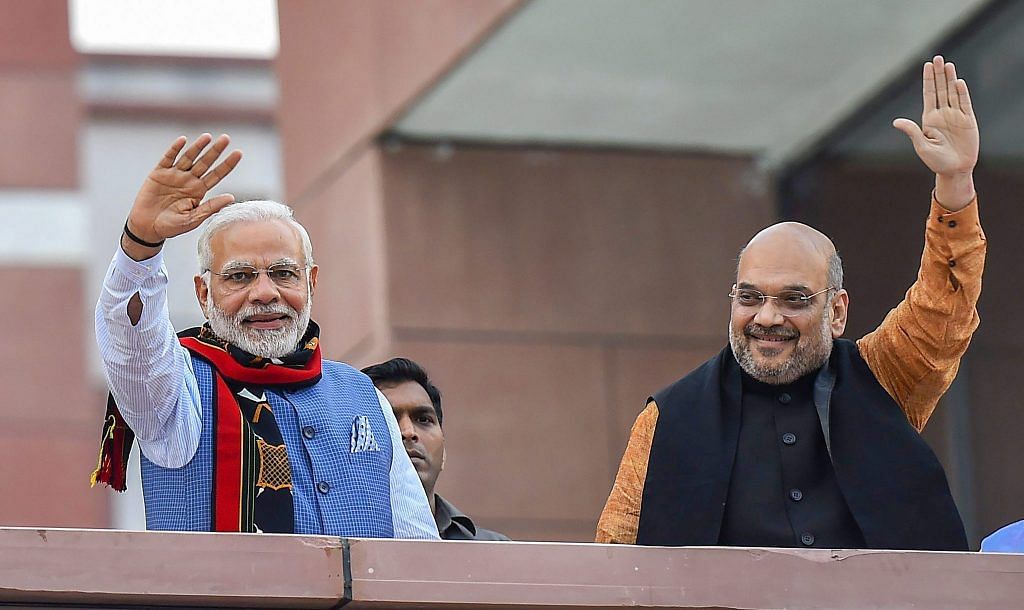New Delhi: Union Home Minister Amit Shah has said that Prime Minister Narendra Modi fought the Gujarat riot allegations for 18 to 19 years “without saying a word” – a day after the Supreme Court dismissed a plea for further investigation.
In an interview to news agency ANI, Shah said the “tall leader silently fought these claims because the matter was in courts. He braved all pain like Lord Shankar did ‘vishpaan’ (drank poison)… I saw him suffering through this very closely. Only a strong-willed person could have taken a stand not to say anything as the case was sub-judice,” Shah said.
The central minister said Modi set an example by showing “how the Constitution can be honoured”. “He was questioned but nobody staged a dharna and workers didn’t come to stand in solidarity with him.”
Shah demanded that those who levelled allegations against him should apologise, “if they have a conscience”.
The BJP leader also took an apparent jibe at the Congress’ protests as leader Rahul Gandhi is today questioned by the Enforcement Directorate in a money-laundering case.
He said: “Modiji didn’t do drama while appearing before the SIT. He didn’t ask people to come out in his support, didn’t call MLAs and MPs to sit on dharna,” Shah said, adding: “Instead, he was ready to cooperate with the SIT. Why protest?”
Just 24 hours ago, the Supreme Court dismissed a plea by Zakia Jafri, the wife of murdered MP Ehsan Jafri, challenging the Special Investigation Team’s (SIT) clean chit to 64 people, including then Chief Minister Narendra Modi, in the 2002 Gujarat riots.
“The Supreme Court has dismissed all allegations. The truth has come out shining like gold. I am very happy,” Shah added.
The Union Minister slammed the Bharatiya Janata Party’s “political rivals, certain ideology-driven journalists who came into poliitics, and non-government organisations (NGOs)” for hyping up Prime Minister Narendra Modi’s alleged role in the 2002 Gujarat riots.
He said the troika had publicised the claims — “they had a strong ecosystem so everyone started believing the lies were the truth,” Shah said when asked about the criticism that the police and officials did not do much to quell the riots.
He said Friday’s judgement – which he hurriedly read – “clearly mentioned activist Teesta Setalvad’s name. She had an NGO that made applications against BJP workers at all police stations. There was so much pressure by the media that all applications were treated as the truth.”
Civil rights activist Teesta Setalvad is the secretary of Citizens for Justice and Peace (CJP), an organisation that advocated for the 2002 victims. CJP was a co-petitioner that sought a criminal trial against Modi and 63 others for alleged complicity in the Gujarat riots.
The apex court on Friday rejected an appeal to open the case, with a bench stating the material collected during the investigation does not “give rise to strong or grave suspicion regarding hatching of larger criminal conspiracy at the highest level” for causing mass violence against Muslims.
The top court said Zakia Jafri’s plea was “devoid of merit”. It spoke of “the devious stratagem to keep the pot boiling, obviously, for ulterior design” and said all those involved in “such abuse of process need to be in the dock and proceeded with in accordance with law”.
The top court also upheld the Gujarat High Court order on 5 October, 2917 which rejected her plea against the SIT decision.
Ehsan Jafri was among the 68 people killed in Gulberg Society in Ahmedabad on 28 February, 2002, a day after a coach of the Sabarmati Express was burnt at Godhra killing 59 and triggering riots in Gujarat.
Amit Shah also said the Supreme Court made it clear that Zakia Jafri “worked on someone else’s instructions”. “An NGO signed affidavits of several victims and they didn’t even know. Everyone knows Teesta Setalvad’s NGO was doing this. When the UPA government came to power at that time, it helped this NGO,” he said.
The BJP leader emphasised the top court had clearly said in its Friday verdict that the riots after burning of the Godhra train weren’t pre-planned but self-motivated. “Tehelka’s sting operation was dismissed — because when the footage before and after the incident came to light — it was found the operation was politically motivated,” he said.
Shah said the administration had done a good job. “But there was anger due to the Godhra train-burning incident, and nobody had an inkling — neither the police, nor anyone else. It wasn’t in anyone’s hands later,” he said of the horrific riots.
The Union Home Minister said the main reason behind the riots was the Godhra train burning. “Fifty-nine people, including a 16-day-old child, were set on fire. No parade (of the bodies) was done, that’s false. They were taken to the Civil Hospital and the bodies were later taken home in closed ambulances by families.”
Shah said there were no professional inputs of “such escalated reactions”. “Everything was done (to control the situation). It takes time to control. Gill Sahab (former Punjab Director General of Police, the late K.P.S. Gill) had said he never saw a more neutral and prompt action in his life. Still, allegations were levelled even against him.”
Shah also said the Gujarat government was not late. It had called in the Army the very afternoon of the Gujarat-bandh day. “The Army takes some time to reach… there wasn’t even a day’s delay. The court appreciated that too,” Shah added.
Sources estimate nearly 2,000 people were killed in the 2002 Gujarat riots. Rapes, widespread looting and destruction of property were also reported.
Also read: Modi govt’s assault on democracy is more sinister than the Emergency. Look at the differences
